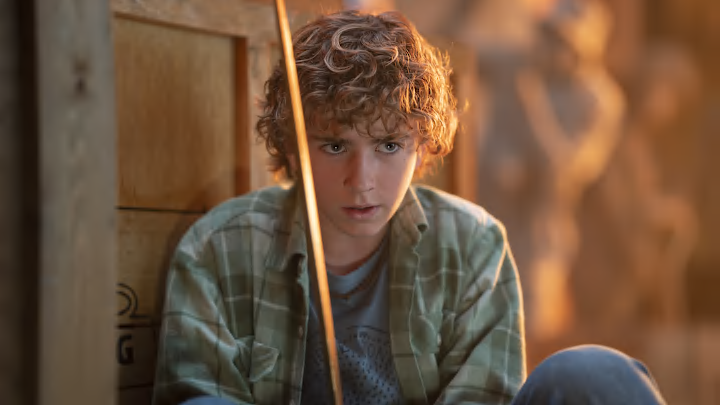Episode 3 of Percy Jackson and the Olympians, titled “We Visit the Garden Gnome Emporium,” is now live on Disney+. It follows chapters 9 through 11 of the book The Lightning Thief by Rick Riordan. While the episode sticks very close to the source material, there are some small differences in this episode that are worth noting.
- We begin back at Camp Half-Blood, where Percy has been sent after finding out that he is the son of the Greek god Poseidon. We see Percy carefully selecting his two quest mates from a pool of worthy candidates: after hearing the Oracle’s prophecy that he will be betrayed by a friend, he picks Grover because he can’t imagine his best friend ever betraying him, and Annabeth because he can’t imagine her ever becoming his friend. In the book, Annabeth volunteers for the quest and Percy is happy to let her come along, recognizing her talent for planning as a useful asset for their deadly dangerous quest.
- At one point in the episode, Percy and Chiron the centaur have a conversation where Chiron explains some of the show's mythology. In the book, their conversation is much longer, with Chiron explaining things about quests, weapons, titans and how the gods are linked to western civilization in general. The show introduces some of these details differently, and is probably saving others for later. I feel like the show is doing a great job at providing just the right amount of information so far.
Differences between the Percy Jackson books and the show: The Furies and the bus
- Once the quest begins and our three heroes are on the road, they hit their first challenge when the Furies show up on the bus to Los Angeles. In the book, this scene is longer and more dramatic. Annabeth gives Percy her magic Yankees hat to turn him invisible so he can run away from danger, which he momentarily does before deciding to stay back and protect his quest mates.
- In the show, we see an interesting exchange between Annabeth and Alecto/Mrs. Dodds that we don’t get in the book, whichi is told exclusively through Percy’s point of view. However, in the book Annabeth does say, “Maybe I should tell you... something funny back on the bus...” and never gets to finish that sentence. Was that conversation with Alecto what author Rick Riordan had in mind all along?
- Percy and Annabeth fight less in the book, and reconcile right after they bicker, while the show makes Grover intervene as intermediary and referee between. In the episode, Grover sings a little get-along song. I can’t complain, especially because it reminded me of his song from The Lightning Thief musical titled “We’re in the same boat.”
- Speaking of Grover's musical talents, the show might have eliminated his ability to play pipes to communicate with nature, which he does several times in this chapter.
- In the book, after the bus explodes, the trio walks for hours, Percy and Annabeth have a heart-to-heart. In the dark, Percy comedically slams into a tree, falls and trips his way to Auntie Em’s emporium, which is located at a gas station. In the show, they seem to find it right away on the satyr’s path in the woods they’re on, which provides an opportunity to bring up Grover’s Uncle Ferdinand.
Differences between the Percy Jackson books and the show: Medusa’s lair
In the book, our heroes are not chased by Furies. They choose to go into Auntie Em’s emporium because they are starving and drawn in by the delicious smells; there are some strong Hansel and Gretel vibes. Percy’s will is being ruled entirely by his stomach and Annabeth agrees to go in; Grover alone has a bad feeling about the place. Em doesn’t mention that she knows they’re demigods; they say they’re orphans with a traveling circus and she pretends to believe it. Despite the many signs, they don’t realize she’s Medusa until she asks to take a photo of them (read: petrify them). When Annabeth finally understands, it’s almost too late, but the heroes manage to defeat Medusa.
But doing so is no easy task, especially with Alecto after them. Alecto is too scared of Medusa to chase the trio inside; in the end, Percy uses Medusa’s head to petrify Alecto. While I’ve always enjoyed the book's version of events, this take might just be my new favorite, with Medusa planting the seed of doubt in Percy’s mind about the gods and their intentions. The best line of the episode may be Medusa saying to Annabeth, “I wasn’t like you. I was you,” referencing her past blind devotion to Athena, a goddess who repaid her faith by ruining Medusa’s life.
The writers of this episode did a great job addressing Medusa’s real origin story, which is barely hinted at in the book. The show might be PG-rated, but the producers managed to convey that her tragic backstory is one of rape, without ever uttering the word abuse. Children watching may understand that Medusa experienced some kind of violation or betrayal at Poseidon’s hand, while adults can grasp the enormity of the issue. This was done with perfect nuance and executed flawlessly by actress Jessica Parker Kennedy.
Afterwards, Percy and Annabeth have another fight about their parents, which Grover quenches. From this moment on, they seem to finally have reached an understanding, which might be the most important milestone of this quest.
In the last few seconds of the episode, we have an exciting cameo by Hermes, played by none other than Lin-Manuel Miranda. I cannot wait to see more of him in this role.
Episode Grade: A
To stay up to date on everything fantasy, science fiction, and WiC, follow our all-encompassing Facebook page and sign up for our exclusive newsletter.
Get HBO, Starz, Showtime and MORE for FREE with a no-risk, 7-day free trial of Amazon Channels
